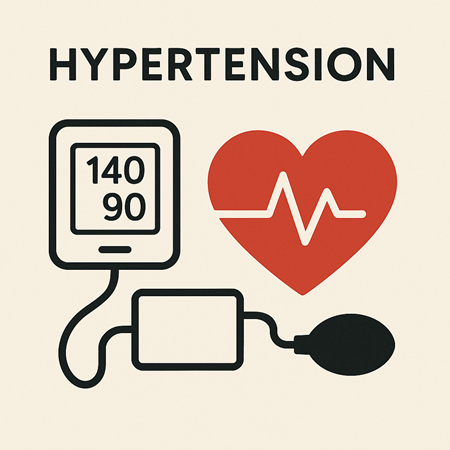
Hypertension, commonly known as high blood pressure, is one of the most prevalent and dangerous health conditions worldwide. Despite being widely recognized, many people remain unaware of the severity of the condition and the steps needed to manage it. This article will explore what hypertension is, its causes, symptoms, complications, and effective strategies for prevention and management.
What is Hypertension?
Hypertension occurs when the force of blood against the walls of the arteries is consistently too high. Blood pressure is measured using two numbers:
Systolic Pressure: The pressure when the heart beats.
Diastolic Pressure: The pressure when the heart rests between beats.
A normal blood pressure reading is around 120/80 mmHg. Hypertension is diagnosed when readings consistently exceed 130/80 mmHg.
Types of Hypertension
Primary Hypertension:
Most common type (about 90-95% of cases).
Develops gradually over many years.
No identifiable cause but linked to genetics, lifestyle, and age.
Secondary Hypertension:
Caused by underlying conditions such as kidney disease, hormonal disorders, or medication side effects.
Typically more sudden and severe.
Causes and Risk Factors
Several factors increase the risk of developing hypertension:
Genetics: Family history of hypertension.
Age: Higher risk as you age.
Diet: High salt, saturated fat, and processed food consumption.
Physical Inactivity: Lack of regular exercise.
Obesity: Excess weight puts additional pressure on the arteries.
Stress: Chronic stress may contribute to elevated blood pressure.
Alcohol and Tobacco Use: Both can negatively impact cardiovascular health.
Symptoms of Hypertension
Often called the “silent killer,” hypertension rarely presents symptoms until it reaches a severe stage. Some possible symptoms include:
Headaches
Shortness of breath
Nosebleeds
Dizziness
Chest pain
However, these symptoms are not specific to hypertension and often indicate a hypertensive crisis or related complications.
Health Complications
If left uncontrolled, hypertension can lead to severe health issues:
Heart Disease: Including heart attacks and heart failure.
Stroke: Increased risk of brain damage.
Kidney Damage: Can cause chronic kidney disease.
Vision Loss: Damage to the blood vessels in the eyes.
Aneurysms: Weakening of blood vessel walls.
Prevention and Management
Managing hypertension involves lifestyle modifications and, if necessary, medication:
Diet: Reduce salt intake, eat more fruits, vegetables, and whole grains.
Exercise: Engage in at least 150 minutes of moderate activity per week.
Weight Management: Aim for a healthy BMI.
Limit Alcohol: Keep consumption within recommended limits.
Quit Smoking: Tobacco cessation is essential for heart health.
Stress Reduction: Practice relaxation techniques like meditation or yoga.
Medication: Follow your healthcare provider’s advice and take prescribed medications as directed.
Final Thoughts
Hypertension is a major global health issue that requires proactive management. Early detection through regular blood pressure checks is vital. If diagnosed, combining lifestyle changes with medical treatment can effectively control blood pressure and reduce the risk of severe complications. By understanding and managing hypertension, individuals can lead healthier, longer lives.